#tolkien appreciation post
Text
Y'all need to see this omfg this is so good holy shit I'm so normal about this
#it's a rubber#silmarillion#oath of feanor#feanor#curufinwe#tolkien appreciation post#jrr tolkien#tolkien#elves#flight of the noldor#noldor#silmarils#sons of feanor
2K notes
·
View notes
Text
I think I finally understand why I find Silm writers scary--and it's 0% their fault.
First of all, the Silmarillion itself is scary. I crawled through my first read of that book over 10 years ago, and I can't even say I digested all that info properly. I'm currently attempting a re-read, and it's only slightly easier this time around.
Silm writers not only have a clear grasp of the massive source material, but they are SO creative in thinking up story ideas spanning the entire breadth of the legendarium. It's mind-boggling. It's wizardry. The style, quality, and depth of their writing make me feel like a fraud. Or a wee baby Tolkien writer just trying their best.
The only "Silm" fics I would/could write are tales that would support the background histories of my Third Age LOTR/Hobbit characters. I would not blame real Silm writers for seeing that as frivolous and quite dumb. Though again, this is probably just my own insecurities barking, because every Silm writer who has befriended me has been super gracious and encouraging. Thank you guys--I appreciate you so much!
TLDR: This is how I imagine myself when my Silm writer friends comment on my fics/headcanons/random Silm-adjacent nonsense:

@hobbitwrangler @glorf1ndel @emyn-arnens @cuarthol @cycas @doodle-pops @a-world-of-whimsy-5 @niennawept
#this is a weird little appreciation post i guess#silmarillion#the silm fandom#the silmarillion#silm#tolkien
169 notes
·
View notes
Text
I love digging into Tolkien lore because it feels EXACTLY like doing research on any other mythology, Greek, Roman, Norse, Celtic...
You have all those big media adaptations you have to get out of your head to return to the actual sources.
You have all those epic tales and short stories and other main corpus forming the "certain" part of the text ; with then a flood of unfinished stories, fragments, drafts and other companion-pieces that either form the scholia or the apocrypha of the main texts.
You've got all the cultural parallels and mythological references begging for a mythology comparatist to come in.
You've got the complex theology and its evolution ; you've got entire maps of foreign lands you have to learn about ; you've got complicated family trees filled with characters that range from massively complex and multi-faceted to just one more name in the list.
You've got the dry scholars who enforce stern and biased beliefs ; you've got the weird fanatic groups that reinvent it all for vile purposes ; you've got your Youtube and Tumblr enthusiast who keep making their lore-headcanons ; you've got the intense debates about what is canon and what is not ; you've got people who try to share explanations about it but only massively simplify it all...
You have an entire world that had been built for decades and decades by a brilliant man, crossing all the genres from romance to tragedy passing by the epic and the fairytale ; to the point we have little bits of pieces about obscure corners of this world and some unknown character that never influenced anything in the big scope of things and yet they still have their own story...
You have heavily complex lore and background for entire cities, bloodlines, calendars, customs, laws, landscapes, and yet just as many mysteries and unanswered questions left for the imagination of those that would follow...
And as you keep digging, you find back all the elements from your favorite mythologies (Greek, Norse, Biblical, Arthurian, Finnish) but mixed together in a fresh, inventive, clever way, with tons of new inventions that became so iconic and so culturally people and so archetypally widespread... that it really does feel like you are looking at a mythology.
#this was my random tolkien appreciation post#tolkien#legendarium#lord of the rings#middle-earth#mythology#fictional mythologies#lotr#mythopoeia
103 notes
·
View notes
Text
Can someone who knows more about Lord of the Rings explain to me why Galadriel's ring isn't evil? I just reread the Lothlorien chapters, where she makes it clear that the power of her ring--one of the three Elven ones--is why Lothlorien is so beautiful and safe, but it's still under the sway of the One Ring, because destroying it will make Lorien fade. How can her ring be unambiguously good when it's under the evil power? Why would taking the One Ring corrupt her into something terrible when she's been wearing one of its satellites for eons? Did her ring start out good and then come under the One Ring's influence? Is it just that the One Ring is much more powerful than hers, so she can resist hers but couldn't resist the main one? Is it a commentary on how even the good works of this world are ultimately corrupted? It just seems murky and I'd like a clearer understanding.
#lord of the rings#tolkien#i realize the irony of posting this right after my ode to realism#but my appreciation for realism hasn't dimmed my love of fantasy#and i'm particularly loving tolkien for the grounded realism of his approach to the epic so it kind of still fits
149 notes
·
View notes
Text
Fighting against the familiar compulsion to POST something as soon as it's written.
The grownup headcase equivalent of a child showing their parents what they did in kindergarten, I feel the need to show my stuff to strangers on the internet with a
"Look! I made a thing!"
And want someone to pat my head and tell me I'm doing great & they're proud of me.
#I'd show my Mom or bestie but they no good english oke?#anyway i DID A THING#im writing something and so far its turning out AWESOME#must not post must not post MUST NOT POST#you already have 6 other WIP bitch#send help#my braaaaaaaain#it cannot be stopped from headcanons and ideas#aaaaasrrrrrggghhhh#the hobbit#tolkien#middle earth#the hobbit fanfiction#fili and kili#fili durin#thorin oakenshield#lord of the rings#fíli#kili durin#frerin#frerin appreciation#ofc#omc#ao3 writer
15 notes
·
View notes
Text

why are they like this
#stop obsessing over my boy sam both of you it's embarrassing you have WORK to do#i'm glad tolkien has his priorities straight tho this was a piece of vital information in the middle of a fatal quest to save the world#and during a heartbreaking epic farewell between all these people after their mind altering and life changing encounter#that made them reevaluate their entire existence#gardeners appreciation post#frodo baggins#faramir#faramir of gondor#lotr#lord of the rings#the two towers#aspa reads tolkien#the window on the west
9 notes
·
View notes
Note
🏜️ and🍦 :)
🏜️ ⇢ What's your favorite type of comment to receive on your work?
Keyboard smashes! Double kudos! Readers picking out their favorite parts of the work and telling me why it resonated with them!
🍦 ⇢ Name three good things about a character you hate
Saruman... 1. He used to be a decent Ainu. 2. He's got that cool multicolored robe. 3. He's played by Christopher Lee, who will always be a legend. (Christopher Lee was related to Charlemagne. He met Rasputin's assassins. He was a WWII spy. He hunted Nazis after the war. He spoke six languages. He released a metal album at the age of 88. He met Tolkien. I could go on.)
8 notes
·
View notes
Text
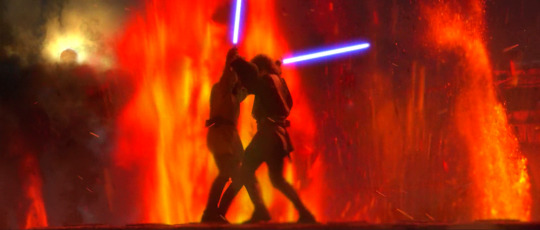
‘Revenge of the Sith may be the greatest work of art in our lifetimes...’
(an excerpt from a long-deleted blog post, archived here)
“Revenge of the Sith is still (and probably always will be) the greatest thing that will ever come out of the Star Wars franchise. I always go further, in fact, and say that it’s the greatest thing that will ever come out of big-budget, action/fantasy cinema at all. George Lucas’s final contribution to his Star Wars legacy—2005’s final prequel offering—was not only an artistic, cinematic and operatic masterpiece, but it was the ultimate, consummate manifestation of everything Star Wars was capable of being and, for that matter, everything that big-scale cinema is capable of being.
It literally does not—and probably can’t—get better than this ever again.
Lucas, who himself pretty much set the standard and invented the genre in 1977, had now taken us to the absolute zenith of what that genre of film-making could produce.
Epic, ambitious, stunning, moving, nuanced, and everything else, it was the glorious completion of Lucas’s original Star Wars saga that I had been waiting for—and something for which I will always be immensely grateful George Lucas came back to film-making to give us. I have already made the case at length for why Revenge of the Sith was an absolute masterpiece of staggering proportions, so I’ll refrain from re-stating here all the ... reasons I eternally bow at the altar of that film and its unfairly maligned architect.
People who didn’t get it or still don’t get it probably never will get it.
I’ve given up arguing with those on the tedious backlash bandwagon, those who join in with the Lucas-bashing for the sake of YouTube channel views, or those who, like [spoilt children] throwing a tantrum, bitterly disavow George Lucas and whine about how the prequels ‘ruined Star Wars’.
Someone who did get it, however, was the noted author and social critic Camille Paglia: she of course famously declared a few years ago that George Lucas was the greatest artist of his time and specifically that Revenge of the Sith was the greatest work of art in the last thirty years.
The respected, if often controversial, academic Paglia didn’t argue that Episode III was merely the best movie of the last thirty years… but the best work of art in any genre and in any medium.
[...] Predictably a lot of people either assumed Paglia was being sarcastic or they simply pooh-poohed her conclusions. Paglia, however, was not trying to be ironic, and she has reaffirmed and defended her position over and over again and with a passion—Lucas’s final Star Wars film, she maintained, is the greatest work of art in the last three decades.
[...] I cannot think of any film in any genre that has been as absorbing or as immaculate (or as ambitious). Even just conceptually, what Lucas tried to do with the prequel trilogy was staggering and is without any parallel. And while we could argue that the execution was off-the-mark in certain places, the sheer visceral power and broad artistic value of what he did manage to create—even with its various failings—puts Lucas’s saga (and ROTS in particular) into a different stratosphere entirely.
In her own view of it, Paglia especially focuses on the final act of the third prequel—the climactic finale centering on the extended Anakin/Kenobi lightsaber duel against the dramatic lava backdrop and the extraordinarily powerful way that the birth of the Skywalker twins is juxtaposed with the ‘death’ of Anakin and ‘birth’ of Vader. That latter sequence, by the way, in which the death of the mother coincides (and even feeds into) the birth of the ‘dark father’, all of it underscored by John Williams haunting, gothic choral/hymn composition, is just one example (among many) of Lucas’s extraordinarily acute and nuanced levels of vision.
‘The long finale of Revenge of the Sith has more inherent artistic value, emotional power, and global impact than anything by the artists you name,’ she said in this interview with Vice. ‘It’s because the art world has flat-lined and become an echo chamber of received opinion and toxic over-praise. It’s like the emperor’s new clothes—people are too intimidated to admit what they secretly think or what they might think with their blinders off.’
youtube
Speaking to FanGirlBlog, Paglia continued her celebration of Lucas’s final masterwork, saying, ‘I have been saying to interviewers and onstage, "The finale of Revenge of the Sith is the most ambitious, significant, and emotionally compelling work of art produced in the last 30 years in any genre—including literature".
Paglia’s assertions flowed from her 2012 book Glittering Images: A Journey Through Art from Egypt to Star Wars, which in part addressed the problem of modern cultural ignorance and the author’s worries that 21st century Americans are overexposed to visual stimulation by the “all-pervasive mass media” and must fight to keep their capacity for contemplation.
In the book, Paglia discusses twenty-nine examples of visual artwork, beginning with the ancient Egyptian funerary images of Queen Nefertari, and then progressing through various artistic works, including creations from Ancient Greece to Byzantine art and Donatello’s ‘Mary Magdalene’.
She explained, ‘Lucas was not part of my original plan for Glittering Images, which has 29 chapters crossing 3000 years. My goal was to write a very clear and concise handbook to the history of artistic styles from antiquity to the present. When I looked around for strong examples of contemporary art to end the book with, however, I got very frustrated. There is a lot of good art being made, but I found it overall pretty underwhelming. When I would happen on the finale of Revenge of the Sith, I just sat there stunned. It grew and grew on me, and I became obsessed with it. I was amazed at how much is in there—themes of love and hate, politics, industry, technology, and apocalyptic nature, combined with the dance theater of that duel on the lava river and then the parallel, agonizing death/births. It’s absolutely tremendous.’
Paglia also entirely recognised the sheer scale of Lucas’s creation and the value of even its various constituent parts as important or worthy works of art. ‘The fantastically complex model of the Mustafar landscape made for the production of Revenge of the Sith should be honored as an important work of contemporary installation art,’ she argued. ‘And also that Lucas’ spectacular air battles, like the one over Coruscant that opens Sith, are sophisticated works of kinetic art in the tradition of important artists like Marcel Duchamp and Alexander Calder. No one has ever written about George Lucas in this way—integrating him with the entire fine arts tradition.’
The problem is that Lucas and the prequel trilogy have become so widely misrepresented as ‘bad’ that most people don’t know how to deal with someone like Paglia sincerely proclaiming “Nothing in the last 30 years has been produced—in any of the arts—that is as significant or as emotionally compelling as Revenge of the Sith…”
[...] In fact, contrary to widespread misconceptions about how the Star Wars films are viewed, a Rotten Tomatoes poll ... found that Revenge of the Sith (and not Empire Strikes Back) scored as the best-regarded of the [Lucas] movies according to aggregation of archived reviews. So the idea that everyone dismisses the prequels seems like a misconception; but it is fair to say that a substantial body of people —including a lot of people who, rather incongruously, regard themselves as Star Wars fans—do completely dismiss this film along with its two predecessors.
As I said at the start, people who didn’t get it or still don’t get it probably never will get it.
But what has always struck me as pitiful about the whiny ‘Lucas Ruined Star Wars’ attitude is that it seems to flow from the premise that Lucas—a man whose stubborn commitment to his own singular vision gave an entire generation from the late 70s and early 80s unparalleled joy—somehow ‘owes it’ to those same people to do things precisely how *they* deem acceptable. That’s essentially what it comes down to—that he, as the artist, should make the art that the fans or the public want and not follow his own creative vision.
What people don’t realise, however, is that if he had done that from the beginning, there never would’ve BEEN an original Star Wars trilogy at all—and arguably all of these huge blockbuster SF/fantasy films that people spend their money seeing today wouldn’t exist either. What a lot of people also don’t realise is that Lucas was never setting himself up to be a populist or even mainstream filmmaker. On the contrary, he was the avant-garde film geek, the rogue, the outsider. The fact that Star Wars spiraled into a billion-dollar behemoth was an accident; and when the first Star Wars movie was released in 1977, it was an oddity that no one in the film industry understood or believed in.
But Lucas had stuck to his own creative vision—a vision that was largely incomprehensible to everyone else at the time the film was being made—and his singular vision hit the mark big-time and accomplished something unprecedented.
By the time of the endlessly-maligned The Phantom Menace in 1999 and everything that followed, Lucas was still doing exactly the same thing—following his own vision, trying to create something extraordinary and largely ignoring contemporary trends or opinion. The only difference was that the vast fan-base he had acquired from the original films were older now, far more jaded and over-saturated with blockbuster movies (most of which were influenced by Lucas’s pioneering work in the 70s) and they essentially didn’t *want* something new, creative or challenging—they just wanted the same thing they’d had when they were kids.
In effect, they weren’t interested in Lucas the artist or Lucas the pioneer—they only wanted Lucas the Popcorn Movie dispenser. But Lucas the Popcorn Movie Dispenser had never existed—he was simply an illusion created by the extraordinary commercial success of the Star Wars Trilogy.
What Lucas had in fact envisioned—and created—with the prequel trilogy, especially Revenge of the Sith, was something that transcended the whole summer blockbuster ennui, transcended genre, transcended the very medium of film itself, and could be discussed in the same breath as Shakespeare, Virgil and the Aeneid, Julius Caesar, and a number of equally fascinating and endlessly debatable works of serious and complex gravity.
But there was an audience of millions who were instead looking for something that could be discussed alongside Jurassic Park or Terminator 2. Which is fine—Star Wars of course can also be discussed just as validly in that latter context too; but it also exists in a stratosphere beyond it. And because Lucas’s process and vision was in that higher stratosphere a lot of the time, there was a frequent disconnect that occurred, whereby a lot of people were unable to meet him halfway or relate to the films on those kinds of levels.
But Lucas pushed on with his long-envisioned trilogy; and by the time the final installment of his Star Wars saga arrived in 2005, a sizeable proportion of the old fan-base had either departed or were by now just coming to the party for the thrill of seeing Darth Vader one last time. Some dismissed the film the same way as they’d dismissed its two predecessors, some were full of scathing mockery, while others were ambivalent. Some were suitably entertained, but didn’t take it much further than that.
Another group, a smaller minority—myself included—had just seen something of epic, overwhelming proportions and had the greatest cinematic experience of their lives.
But great art is like that.
Great works of art divides people, provoking endless debate [...] An argument could be made that the greatest artist will go all-out to create something special and substantive, even if it won’t appeal to everyone. Said artist would follow his own creative vision and not compromise it to the committee of consensus or demand.
Lucas, it should be borne in mind, never made ANY of the Star Wars films with film-critics in mind—even the Original Trilogy movies were not critically approved, despite becoming cultural landmarks. And interestingly, the hang-ups of many of those who were scathing about the prequel movies—ROTS included—were virtually identical to the hang-ups of the critics in the early 80s who either just didn’t get those original Star Wars films or were unwilling to praise a rogue filmmaker who was rebelling against Hollywood at the time and who was making something entirely out-of-step with contemporary trends and sensibilities.
Fittingly enough, the Lucas who was out-of-step with the sensibilities of the time during the late 70s and early 80s is the same Lucas who was equally out-of-step with sensibilities and trends at the time of the prequels too. In both eras, Lucas rebelled against the sensibilities of contemporary cinema and carved out his own piece of utter magic according to his own stubborn vision—the difference is that so many of the same people who adored what he had done in the first instance couldn’t understand what he was doing in the second instance.
Even though what he was doing was essentially the same thing.
For that matter, I always suspected that one of the main reasons so many people failed to appreciate (or in a lot of cases, to even understand) this film is precisely because it isn’t contemporary. That’s a key thing to understand about the Star Wars prequels—they were not made in a contemporary style.
Lucas doesn’t make contemporary cinema. Both of Lucas’s Star Wars trilogies are written and designed specifically to NOT be contemporary, but to have a more timeless quality, steeped in traditions from the past.
Lucas, you have to remember, has never been a contemporary or generic filmmaker, but a more avant-garde artist and experimenter who foremost specialises in tone and impressionism. The fact that he invented modern blockbuster cinema is purely an accident. As he himself once said, “None of the films I’ve done was designed for a mass audience, except for ‘Indiana Jones.’ Nobody in their right mind thought ‘American Graffiti’ or ‘Star Wars’ would work”.
[...] They were not contemporary or generic at all—consequently, a lot of people didn’t understand or relate to what they were watching: because they couldn’t find a point of comparison in popular culture.
To really understand these films, you have to go back to some of the historical epics of the fifties and sixties, particularly films like Ben-Hur, Cleopatra or Spartacus. If you watch any of those films (and all three are timeless, truly marvelous cinematic works) and then watch the three Star Wars prequels, it will suddenly make much more sense. The acting style, the dialogue style, the themes, the epic scope and settings, the vast mythologizing, the way the films are scored, even the intricate costume design—all of it.
There’s nothing surprising about that. After all, it’s easy to overlook the fact now from our current vantage-point, but the original Star Wars trilogy movies weren’t contemporary in style either—they were stylistically based on things like Kurosawa, Flash Gordon and the Saturday matinee serials of the 1930s and 40s. The original trilogy films made no stylistic sense in terms of contemporary cinema or sensibilities in the late 70s or early 80s—they were, in style, a homage to a long-gone era.
So too were the prequels—just a different homage to a different era.
[...]
When you look at everything that makes up Revenge of the Sith, the scope of vision along with the degree of artistic nuance and juxtaposition is breathtaking.
There’s lots of action, yes, as you’d expect; but the action, like so much of what Lucas was doing by this stage, is almost transcendent. Sure, the acting or delivery is off in a few places; mostly due to some of the actors having to perform in non-existent CG environments—remember Lucasfilm and ILM were breaking new ground technologically in these movies, which we take for granted now with all our CG and digital filmmaking, but which at the time were bound to cause some teething problems. But Ewan McGregor is superb in this film, while the maligned Hayden Christensen....in fact does a solid job in any number of key scenes.
And there’s everything else. The special effects aren’t just good, they’re actually often beautiful in a way that most special effects don’t aspire to be. The level of detail and artistry in the visuals mean you could turn the sound off and still be captivated. Some of the backdrops could make extraordinary paintings that could hang convincingly in art galleries. And Lucas is the absolute master of the establishing shot and the scene transition, turning it into an art every bit as nuanced as in a piece of music.
For that matter, the music is extraordinary—and actually if you look at how underwhelming or non-existent the music is in the post-Lucas ‘The Force Awakens’, it becomes clear that Lucas and Williams had a collaborative process that really influenced how these films were scored (and which is now no longer the case). Lucas himself said that the music was 50 percent of what mattered in these films and that is certainly evident.
Much of it, particularly the climatic Kenobi/Skywalker duel and that final act with the birth of the twins, death of Padme and creation of Vader, almost isn’t cinema at all—but opera. This could’ve been something Wagner was composing if he had ever existed in the cinema age.
In fact, the final few scenes of the film don’t even have any dialogue, but are purely musical and visual. Even some of the most stirring parts earlier on in the film are without dialogue; take, for example, the breathtakingly beautiful sequence of Anakin and Padme trying to silently sense for each other across the exquisite, sunset cityscape—it’s all visual, tone and subtle music, pure emotion with no dialogue. A scene like that could almost be part of a silent movie; and it’s also like an impressionist painting in motion.
Even that Kenobi/Skywalker duel itself is more than just an action sequence. With Williams’ epic, stirring, choral score, it too is opera. But it’s opera married to performance art: the level of intricacy, fluency and speed of Ewan McGregor and Hayden Christensen’s dueling is insane, having required an immense amount of prep and practise. The choreography takes it onto the level of dance; of true performance art as opposed to disposable cartoon violence or cheap blockbuster action.
Everything here—to the last detail—is choreographed like a ballet and it is spellbinding.
Yet while other filmmakers would try to sell an entire movie on such an exquisite centerpiece, for Lucas all of this—all of this poetry, opera, dance, music, visual art and everything else—is ultimately mere constituent part to a greater whole: a Shakespearan epic of a tortured fall from grace and a Greek tragedy... wrapped within an even larger epic about the fall of a Republic, the fallibility of religion and the genius of the Devil and failure of the angels.
[...] What Lucas created in fact was the ultimate expression/culmination of the art of the epic itself—fittingly enough, in order to conclude the defining epic of our modern times (what Brian Blessed once described as the Shakespeare of our age). The Shakespeare comparisons aren’t trivial. The evident Star Wars/Shakespeare resonance has even prompted things like Ian Doescher’s book William Shakespeare’s Tragedy of the Sith’s Revenge: Star Wars Part the Third—a retelling of Revenge of the Sith as if it had been written by William Shakespeare for real.
[...] Various observers, including academics, have noted the obvious fact that Lucas’s story is also a retelling of the fall of the Roman Republic and birth of the Roman Empire. Lucas himself admitted this, pointing to how Revenge of the Sith in particular is partly a story about democracies become dictatorships and citing the historical stories of Caesar and Augustus. You can quite easily watch the prequel trilogy alongside I, Claudius or something like HBO’s brilliant Rome series.
But none of those references or allusions are the important part. Even the fact that the prequel trilogy—and again, ROTS in particular—is quite clearly in part a story about false-flag wars, banking conspiracies, the corporate and military-industrial complex, the Bush administration and the Iraq War, etc—isn’t particularly relevant to the issue of why it’s such an epic work of significance.
Lucas is the author and architect of our preeminent modern mythology—as interviewer Bill Moyers asserted during his fascinating and revealing 1999 interview with Lucas (for the release of The Phantom Menace). Partly inspired by his friend Joseph Campbell’s thoughts on mythology, but moreover informed by his own careful distillation of elements from various cultures and civilisations (what he has referred to as our collective human ‘archaeological psychology’), Lucas is every bit as influential as Virgil, Homer or Shakespeare were in their respective times, and has crafted out the ultimate mythological saga.
Revenge of the Sith is the final, completing piece of that saga—the piece that gives the saga its full scope and true soul, and the piece that makes every one of the other films count for so much more.
And it does it so well—with such vivid and breathtaking quality—that, even having written an article as long as this one now is (and another before this), I still don’t feel like I’m adequately able to explain its full brilliance.
Neither could Lucas himself, I suspect. I’m not sure Lucas even realised how masterful it was; but, as Paglia and others note, the guy is so mild-mannered and self-deprecating that it simply wasn’t in his nature to boast about his own work. Instead he just took in all the abuse and mockery with mild bemusement, shrugged his shoulders and walked off into the twin sunset, knowing that with Revenge of the Sith he had finished what he’d come back to do.
In fact, what Lucas did was so extraordinary, so complex and so nuanced that it may take another decade or two for people to even appreciate it properly—assuming they ever do. As film experts like Mike Klimo have noted, some of what Lucas did in ROTS and the prequels may have been so sophisticated that he deliberately didn’t talk about it, but just left it there, not knowing that anyone would ever even notice.
This, as I said earlier, goes beyond cinema, and possibly even beyond Star Wars itself. Lucas genuinely outdid himself, and it is unlikely anyone will reach that height again—firstly because no one is going to be in the position Lucas was in again in terms of total ownership of a property, and secondly because no one is going to have that kind of ambition again, especially having seen how much of a backlash Lucas received from the legions of popcorn munchers, YouTube profiteers and ungrateful fans who were really looking for something much more in keeping with a generic, formulaic, standardized blockbuster formula.”
#the prequels#revenge of the sith#rots#george lucas#prequels appreciation#lucas' star wars as created-myth#Paglia is an expert on the Fall of Civilizations#which explains her fascination with RotS in particular#as for the blogger who wrote the post...i don't necessarily agree with every single thing he says#particularly his view on some of RotS' themes#(he seems to miss the fact that the Prequels are not about love as a negative element but are rather about the Fear of Loss )#(Anakin's tragic flaw is not Love but rather his FEAR losing his loved ones to Death)#but there's enough here i found worthy of sharing (and you can read the rest on the wayback machine link)#ultimately i feel that the inability of contemporary audiences to appreciate Lucas' work#is very much akin to the bafflement with which Tolkien's work was met in the mid-20th century#Tolkien was writing in deliberately archaic medieval tradition during the very height of the Modern era#and similarly ...#Lucas was making homages to old-fashioned cinema/Greek tragedy/and mythic Romanticism during the peak of cynical Post-Modernism#audiences seem to have truly have LOST the ability to comprehend older forms of storytelling#and that is the real tragedy
26 notes
·
View notes
Text

Sam doodle :^) taking a little rest by a toadstool
#samwise gamgee#sam gamgee#lotr art#lotr#lord of the rings#tolkien#truths drawings#he deserves to take a lil break i think#also if i hadn't posted my drawing of snufkin my hobbit design would still give me away as a moomin appreciator#i just think it's fun to give them lil inhuman characteristis. make them a lil more creature-like
117 notes
·
View notes
Photo
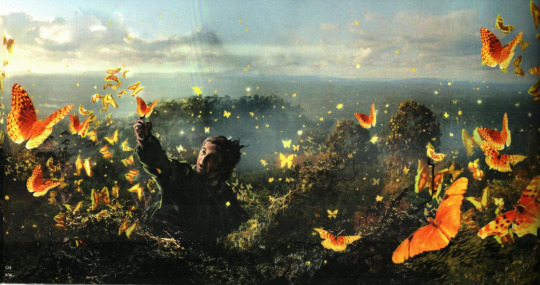


#the hobbit#bilbo baggins#the hobbit desolation of smaug#art and design book#jrr tolkien#the hobbit book#smaug#the hobbit trilogy#the hobbit movies#i love bilbo#part of my tumblr should be called appreciation of Bilbo and The Hobbit#but if you just search for bilbo baggins or the hobbit you'll find more related post in my blog more precisely#Lmao#I can't stop loving this little hobbit
8 notes
·
View notes
Text










𝑰𝒏 𝑫𝒊𝒆𝒓𝒏𝒅𝒆𝒏𝒆, 𝒊𝒏 𝑫𝒐𝒍𝒆𝒏𝒏𝒂𝒏
𝑶𝒇𝒕 𝒘𝒉𝒆𝒓𝒆 𝒅𝒓𝒆𝒂𝒎𝒔 𝒘𝒂𝒏𝒅𝒆𝒓 𝒐𝒏
𝑴𝒂𝒏𝒚 𝒆𝒚𝒆𝒔 𝒉𝒂𝒗𝒆 𝒔𝒆𝒆𝒏 𝒕𝒉𝒆 𝒍𝒊𝒈𝒉𝒕
𝑻𝒉𝒂𝒕 𝒍𝒊𝒏𝒈𝒆𝒓𝒔 𝒕𝒉𝒆𝒓𝒆 𝒆𝒗𝒆𝒓, 𝒍𝒐𝒏𝒈 𝒂𝒏𝒅 𝒃𝒓𝒊𝒈𝒉𝒕.
𝑪𝒍𝒆𝒂𝒓 𝒊𝒔 𝒕𝒉𝒆 𝒘𝒂𝒕𝒆𝒓 𝒐𝒇 𝒚𝒐𝒖𝒓 𝒘𝒆𝒍𝒍;
𝑯𝒊𝒍𝒍𝒔 𝒑𝒂𝒊𝒏𝒕𝒆𝒅 𝒈𝒐𝒍𝒅𝒆𝒏 𝒂𝒔 𝒕𝒉𝒆 𝒔𝒖𝒏 𝒇𝒆𝒍𝒍
𝑾𝒉𝒊𝒕𝒆 𝒊𝒔 𝒕𝒉𝒆 𝒎𝒐𝒐𝒏 𝒖𝒑𝒐𝒏 𝒑𝒂𝒍𝒆 𝒔𝒂𝒏𝒅;
𝑼𝒏𝒎𝒂𝒓𝒓𝒆𝒅, 𝒖𝒏𝒔𝒕𝒂𝒊𝒏𝒆𝒅 𝒊𝒔 𝒍𝒆𝒂𝒇 𝒂𝒏𝒅 𝒍𝒂𝒏𝒅
𝑰𝒏 𝑫𝒊𝒆𝒓𝒏𝒅𝒆𝒏𝒆, 𝒊𝒏 𝑫𝒐𝒍𝒆𝒏𝒏𝒂𝒏
𝑬𝒗𝒆𝒓 𝒂𝒓𝒆 𝒕𝒉𝒆 𝒕𝒉𝒐𝒖𝒈𝒉𝒕𝒔 𝒐𝒇 𝑴𝒐𝒓𝒕𝒂𝒍 𝑴𝒆𝒏 𝒅𝒓𝒂𝒘𝒏.
𝑰𝒏 𝑫𝒊𝒆𝒓𝒏𝒅𝒆𝒏𝒆, 𝒊𝒏 𝑫𝒐𝒍𝒆𝒏𝒅𝒊𝒏𝒈
𝑬𝒗𝒆𝒓 𝒘𝒊𝒍𝒍 𝒎𝒚 𝒅𝒓𝒆𝒂𝒎𝒔 𝒃𝒆 𝒔𝒑𝒆𝒏𝒅𝒊𝒏𝒈
𝑻𝒊𝒎𝒆 𝒘𝒂𝒏𝒅𝒆𝒓𝒊𝒏𝒈 𝒘𝒊𝒕𝒉𝒊𝒏 𝒅𝒆𝒆𝒑 𝒇𝒐𝒓𝒆𝒔𝒕𝒔
𝑨𝒏𝒅 𝒂𝒕 𝒕𝒉𝒆 𝒃𝒐𝒓𝒅𝒆𝒓𝒔 𝒐𝒇 𝒅𝒂𝒓𝒌 𝒍𝒂𝒌𝒆𝒔;
𝑻𝒉𝒆 𝒄𝒐𝒖𝒏𝒕𝒍𝒆𝒔𝒔 𝒔𝒕𝒂𝒓𝒔 𝒐𝒇 𝒉𝒆𝒂𝒗𝒆𝒏’𝒔 𝒇𝒊𝒆𝒍𝒅
𝑴𝒊𝒓𝒓𝒐𝒓𝒆𝒅 𝒊𝒏 𝒕𝒉𝒆𝒊𝒓 𝒘𝒂𝒌𝒆.
Dolennan being of course Hidden Valley, a summer camp I work at within the Griswold Scout Reservation of New Hampshire.
#GSR appreciation post#Dolennan#Tolkien#nature#summer camp#summer#forest vibes#new hampshire#hiking#camping#camp staff
5 notes
·
View notes
Text
Prologue
Hullo, and welcome to the first post! This one will be my thoughts on the several pages of set-up before we get to the actual book.
Direct quotes from the book will be in italics to differentiate them from my rambling :)
1: Concerning Hobbits
My man Jirt immediately mentions The Hobbit about four lines in
'Many, however, may wish to know more about this remarkable people' - I read somewhere that JRRT wanted to publish The Silmarillion after The Hobbit but his publishers were like 'no. more hobbits' , and if that's true I would like to think that this was JRRT's way of being like 'fine. you want more hobbits? i will give you SO MUCH INFO about hobbits'
I strongly agree with hobbits about shoes being annoying - I myself prefer to not wear them when I can (and since I now live in an area without bindies I can assume that it will be safe to walk barefoot on grass)
Early hobbits were living near the Anduin when Greenwood became Mirkwood
The hobbits renamed the river Baranduin 'Brandywine' - aka 'alcohol 1 alcohol 2' and I love that for them
Bullroarer is mentioned twice within the first 5 pages and both times Jirt is like 'it's an interesting story BUT irrelevant here so I'm not going to bring it up again'
I love that we get a full and detailed description of hobbit architecture for multiple paragraphs
'Hobbits delighted in such things, if they were accurate: they liked to have books filled with things that they already knew, set out fair and square with no contradictions.' - Oh, to be a hobbit and not a historical archaeologist constantly arguing about How Things Were
2: Concerning Pipe-weed
Opinions: is pipeweed tobacco or straight-up weed? I know that since Jirt says it's probably a variety of Nicotiana it's probably tobacco, but also it says 'probably' and it's funnier to imagine that hobbits are just constantly high
The Prancing Pony is apparently the home of smoking
'Not even the Wizards first thought of that before we did. Though one Wizard that I knew took up the art long ago, and became as skilful in it as in all other things that he put his mind to.'
And from that information I like to imagine that Gandalf stopped in Bree when he first showed up in Middle-earth, was given a pipe, went 'that's the good shit' and immediately spread it to as many people as he could
3: Of the Ordering of the Shire
Jirt: thank you so much for making it 'the Shire' and not 'The Shire'
I love hobbit naming conventions and the fact that they seem to be the only race in Middle-earth with distinct familial surnames
For some reason the name 'Brandybuck' has a Good Ring to it
The Tooks truly are a wild family - the Thain is apparently 'master of the Shire-moot, and captain of the Shire-muster and the Hobbitry-in-arms' and now I'm imagining a very angry Took leading a small army of 3-foot-tall hobbits sometime in hobbit ancient history
The head of the Took family is just called 'The Took' like they're some notorious criminal
4: Of the Finding of the Ring
Quick recount of the events of The Hobbit in case you haven't read it
Bilbo gave his mithril coat to the Mathom-house in Michel Delving. This shows how little hobbits care about shiny things, but I do find it funny that he was like 'yeah just send the shirt to the House of Random Things' and it stayed there for years
NOTE ON THE SHIRE RECORDS
Bilbo you absolute legend, thank you for being the preeminent Hobbit Historian
If the story of the copies of the Red Book ain't a good description of what actually happens to many historical records I don't know what is
Merry and Pippin, we love hoarder librarians
Elladan and Elrohir apparently stayed in Middle-earth long after Elrond and Galadriel sailed, and Celeborn stayed with them in Rivendell for a while until he sailed too
#jirt#tolkien#reread#reading process#rereading lotr#lotr#idk how to turn on the post cut thing for length#so if anyone could point me in the right direction#it would be much appreciated
0 notes
Text
I have like a Top 10 best characters and i Only care about them and them only but half of them are like, side characters who have 10 lines per sseason on a good year so i basically rotate the M5 in my mind 25/8
#only exceptions being clyde tolkien and kinda jimmy ig cuz they are often used in the more school-centric eps#but it's an hard life for sheila and liane appreciators out there#my post#stuff for me
0 notes
Text
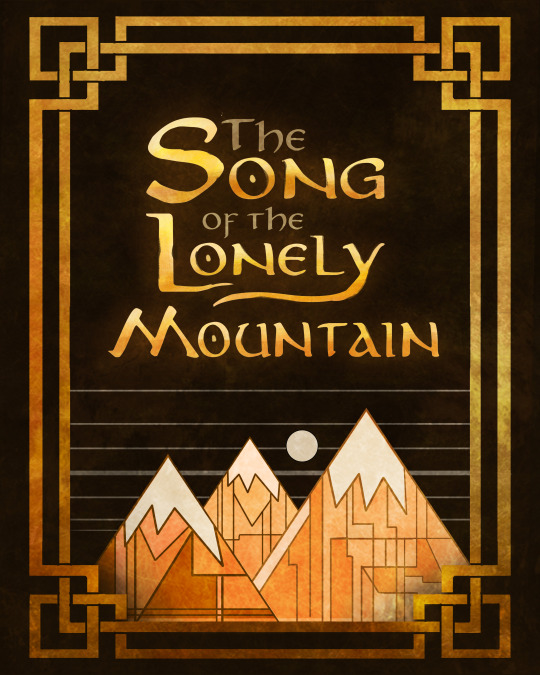
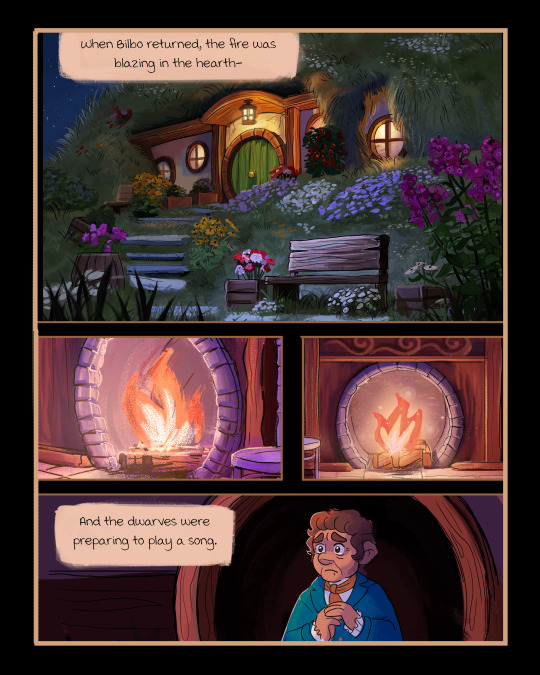
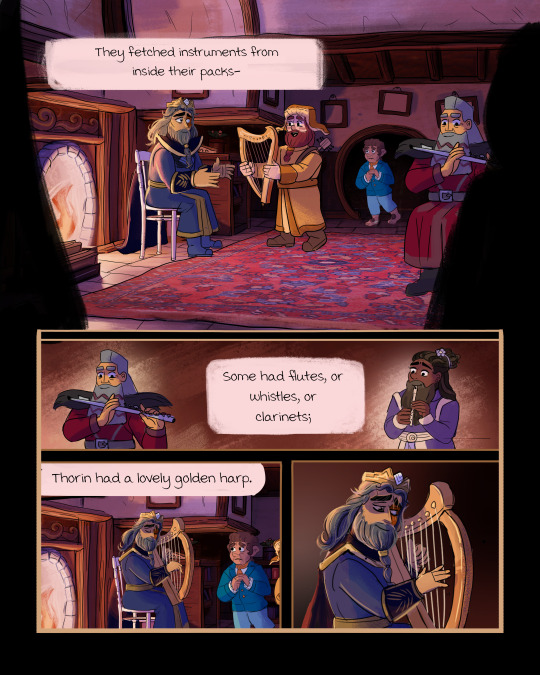
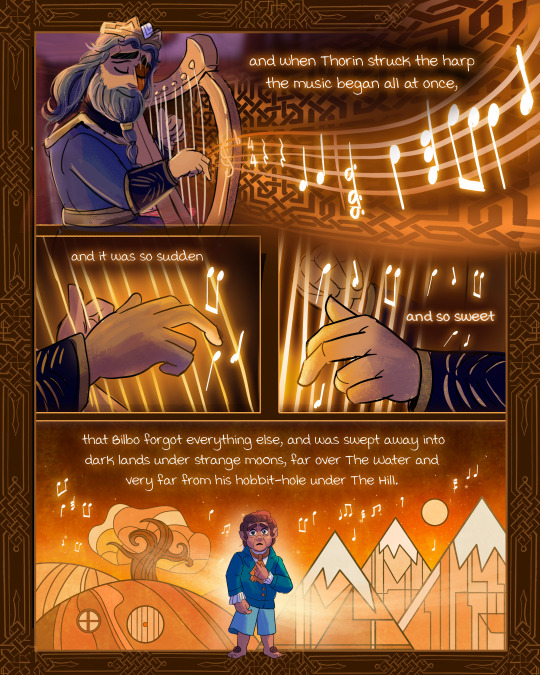
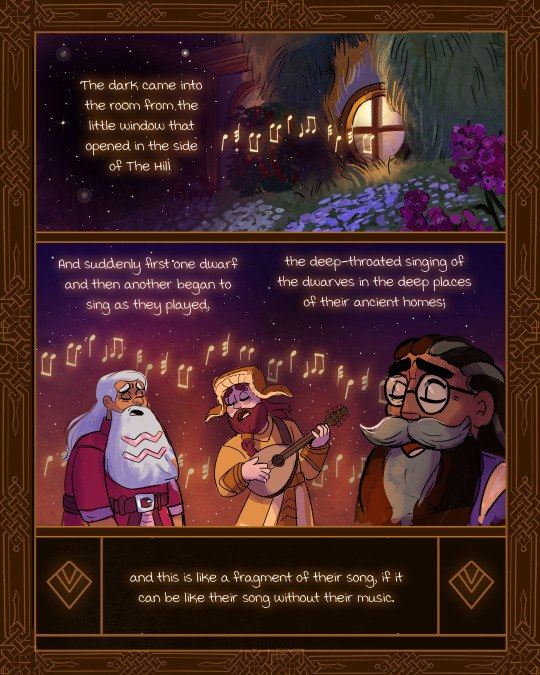
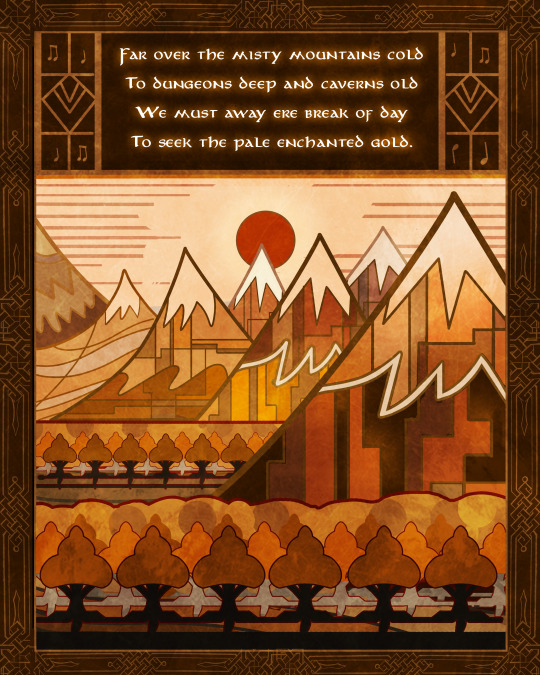
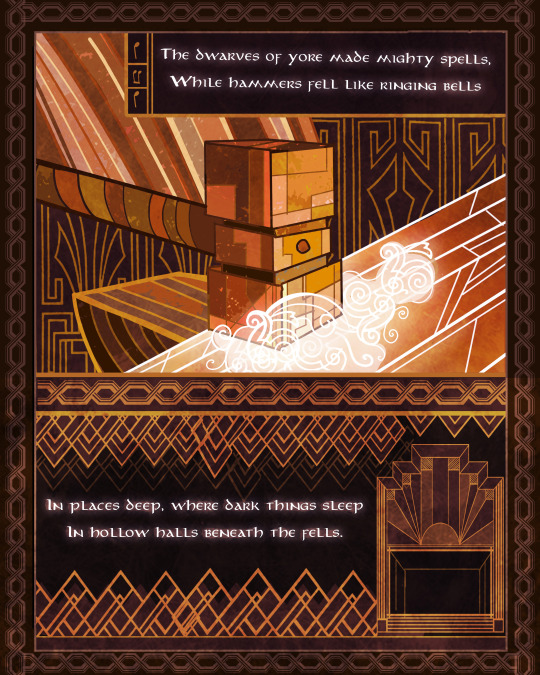
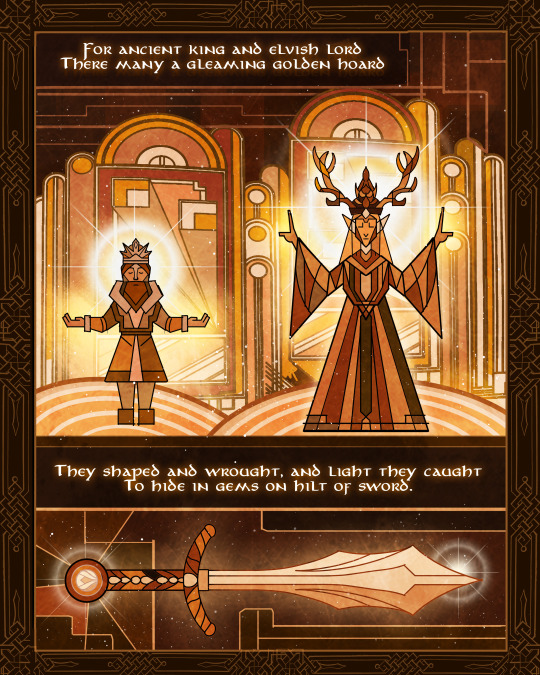
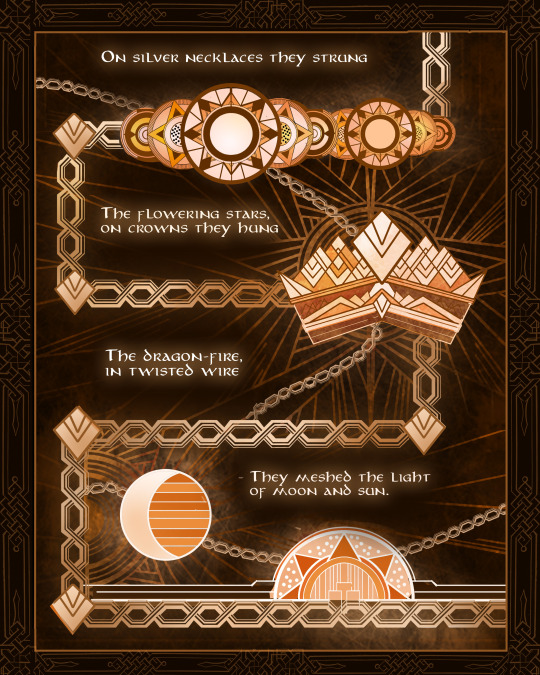
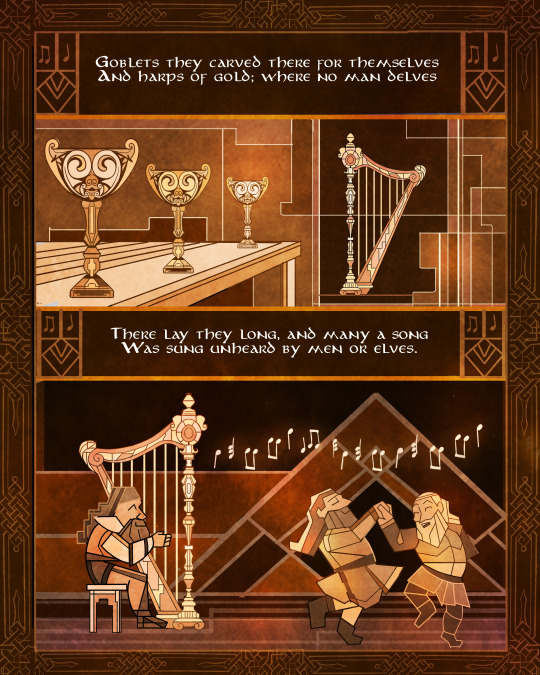
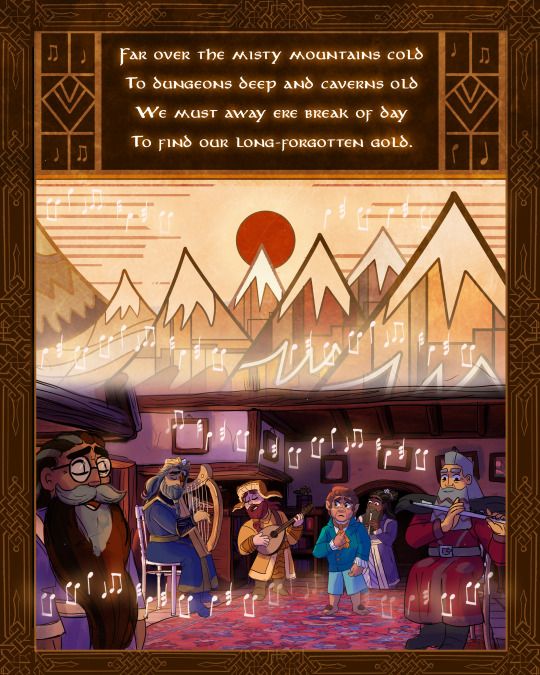
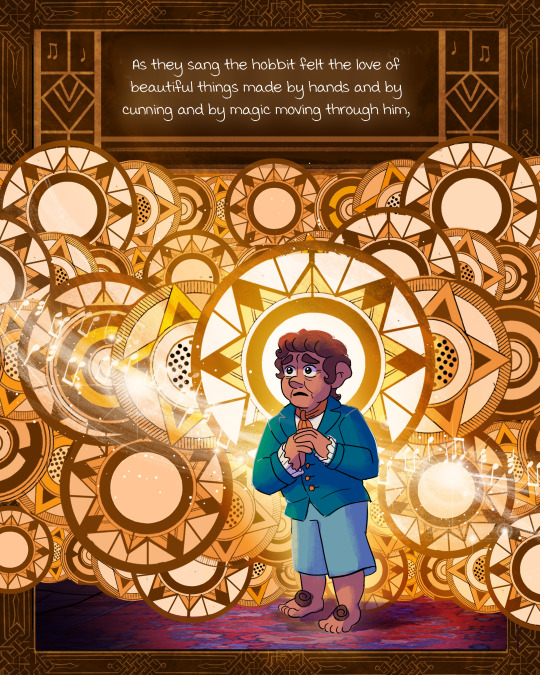
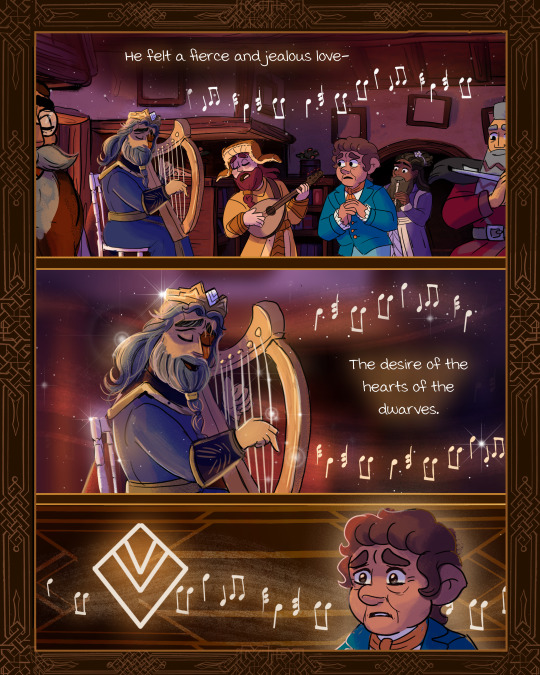
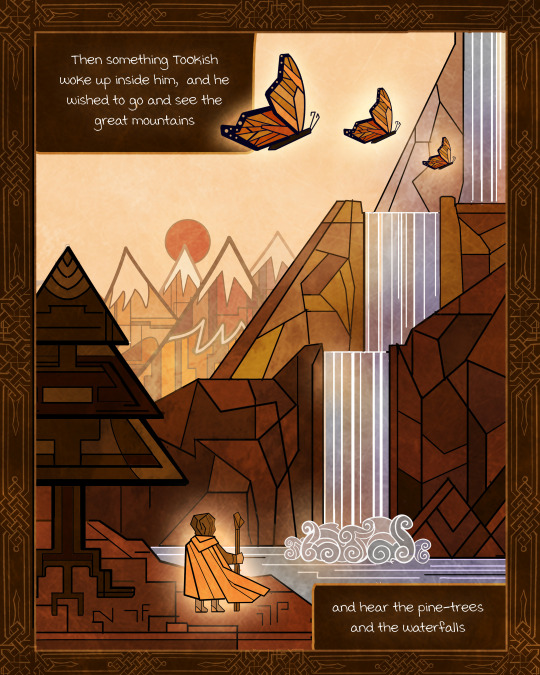
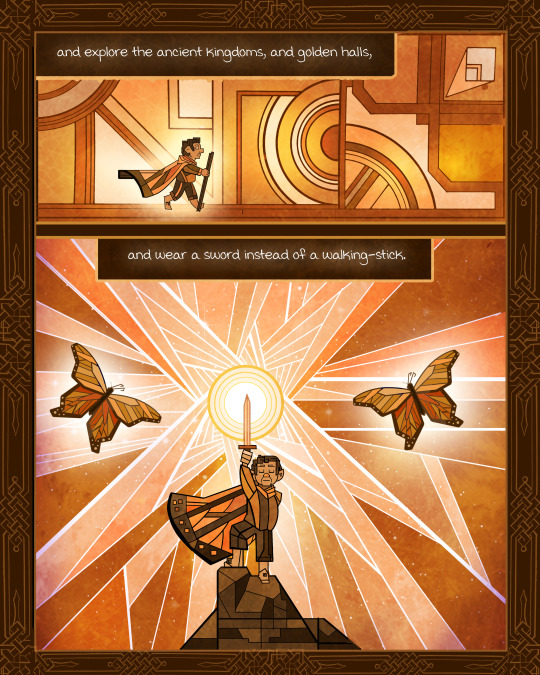
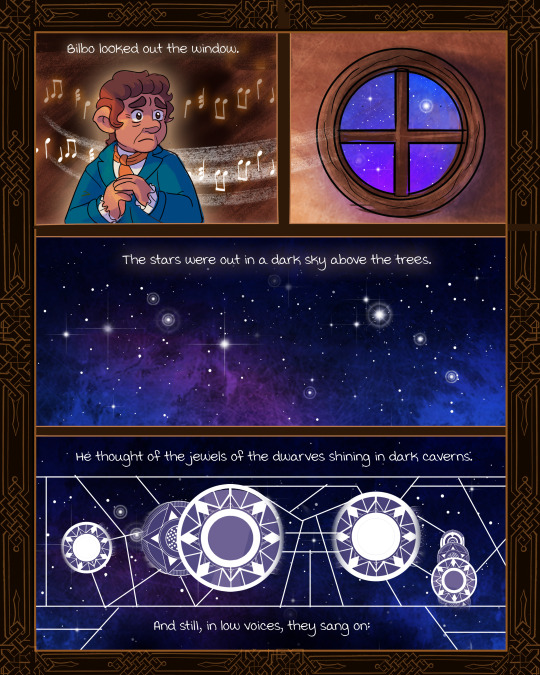
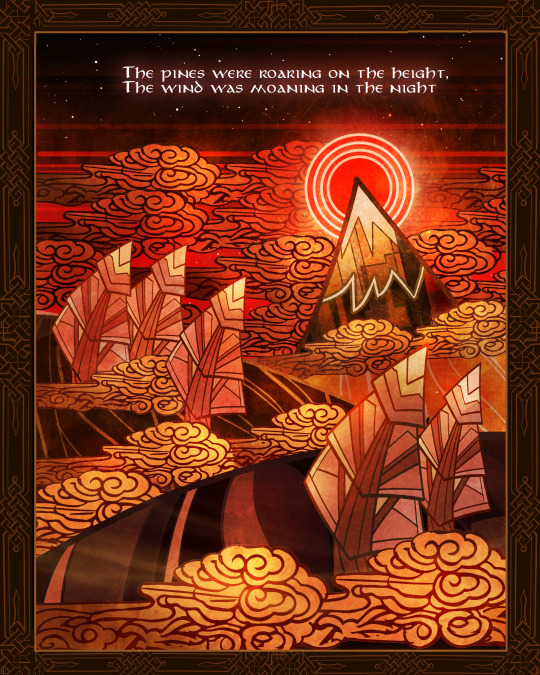
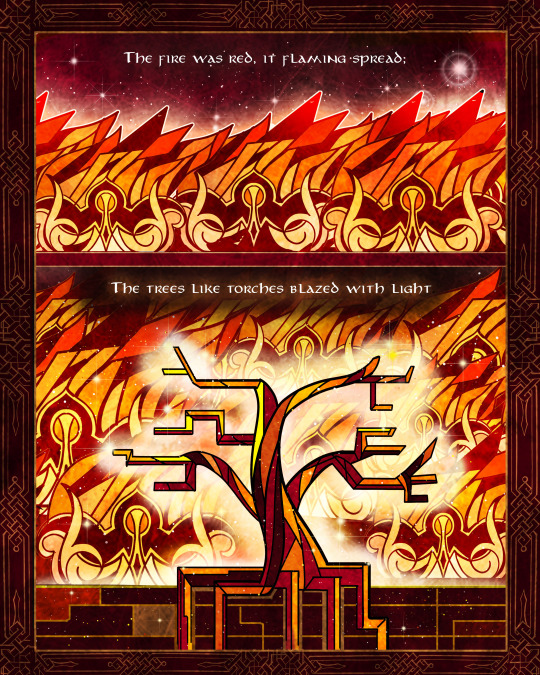
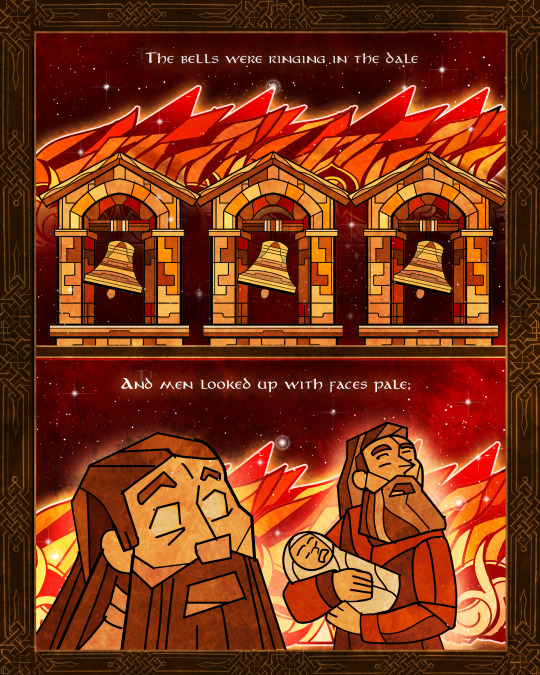
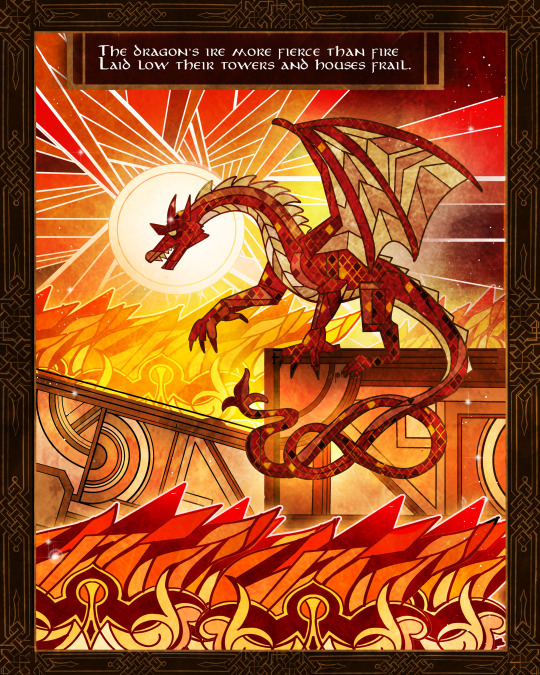
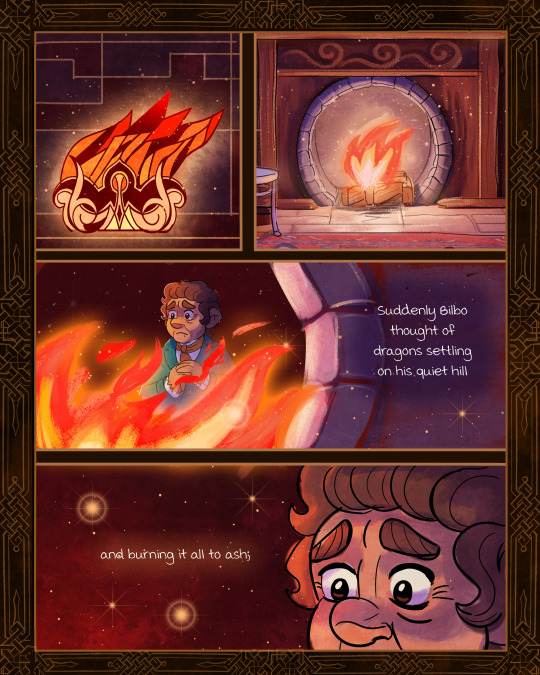
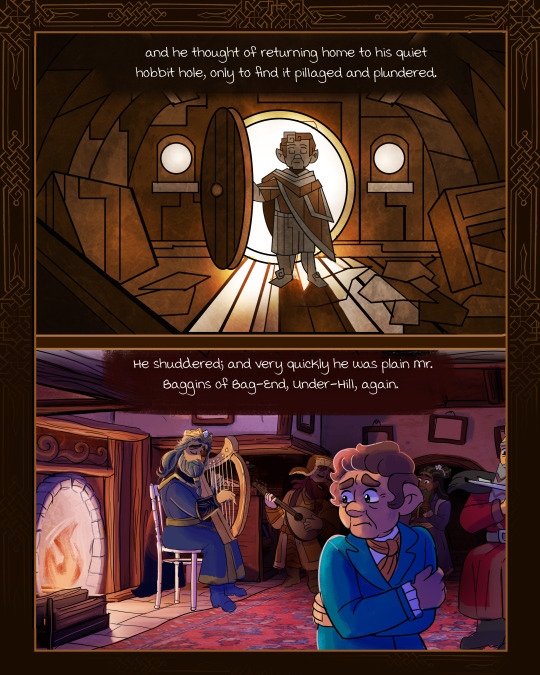
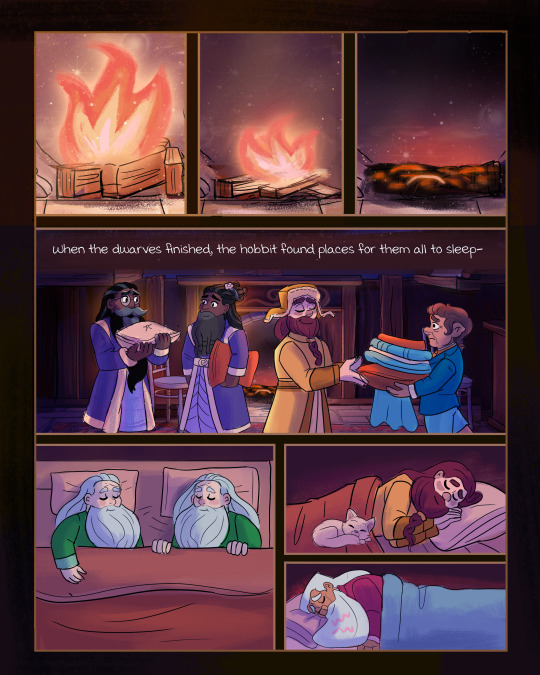
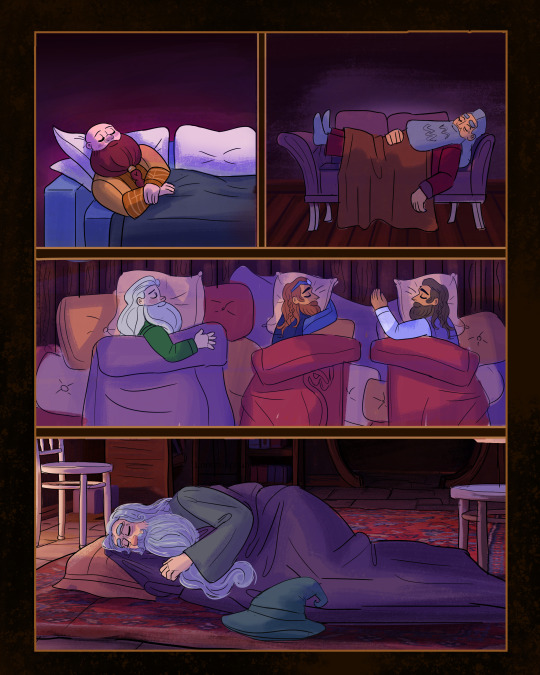
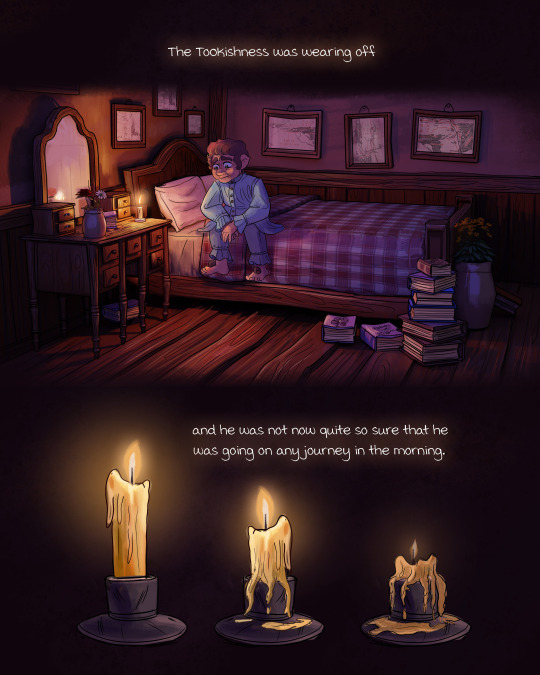
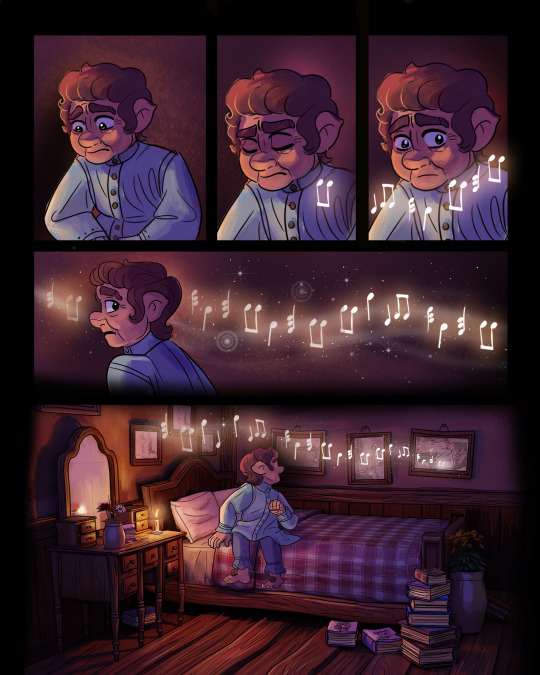
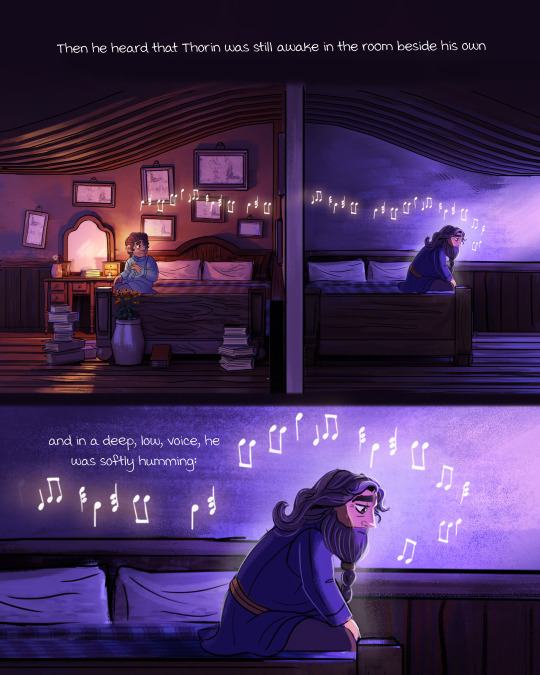
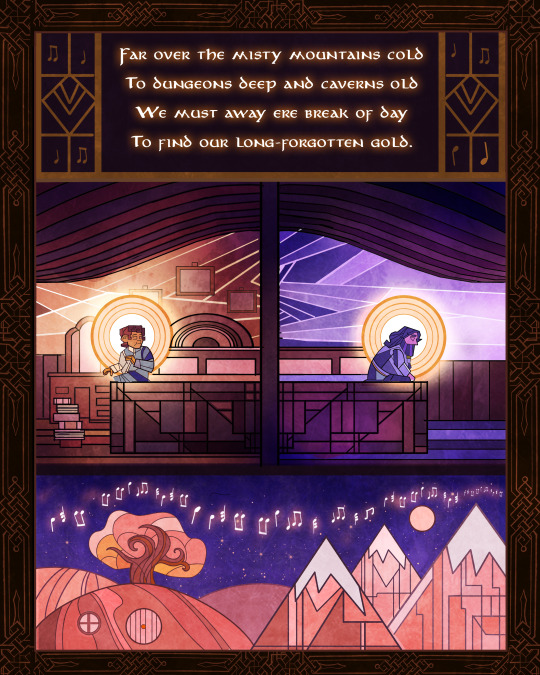
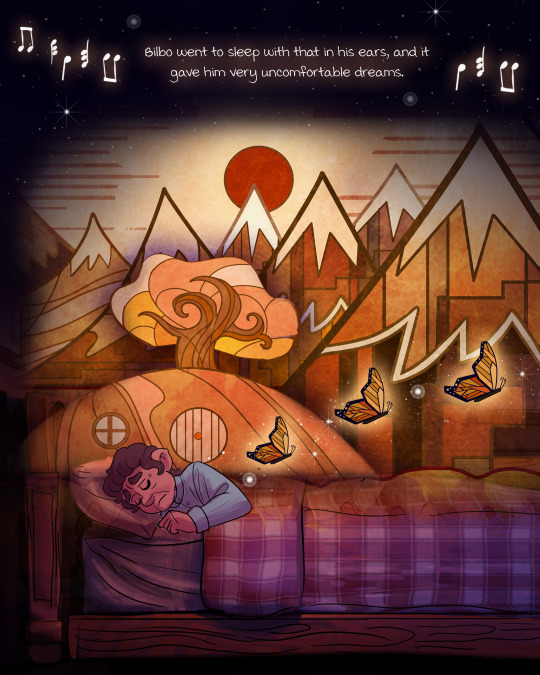
Retelling The Hobbit Chapter 16: The Song of the Lonely Mountain
First chapter / Previous / Next
To view full comic: Webtoon/A03 / Tumblr post with links to all chapters
Other blogs: TikTok/Instagram/Tumblr Sideblog
*crumbles into dust after finishing this* Thank you for reading! This The Hobbit webcomic adaptation thing takes a lot of effort to put together and I can’t tell you how much I appreciate every comment. I also really appreciate the people who’ve spread the word of this comic to their friends! <3
And finally, we’re at the Song of the Lonely Mountain!
Within Tolkien’s canon, The Hobbit is an in-universe book that was “written” by Bilbo Baggins, who occasionally lies/embellishes/exaggerates things. The tonal differences between The Hobbit and Lord of the Rings are explained by Bilbo and Frodo/Sam being different kinds of storytellers, with different relationships to “the truth.” This idea is the core of how I’m adapting the novel! Bilbo is an unreliable narrator who is literally ‘drawing’ from his own limited experiences; the different art styles reflect the different perspectives of other characters. The “dwarf art style” in this chapter is inspired by stonework/metalwork in general— but especially by a mix of art deco, Celtic art, and European folk art.
The central tension of the comic is between Bilbo and Thorin, who each have wildly different ideas about what kind of story they’re in. Thorin is in a grand fantasy epic, while Bilbo is in a lighthearted children’s book adventure. The tragedy is, obviously, that only one side of the story ever gets to be fully told.
On a sillier note, a few years ago I had my first gay crush on a lesbian who sang while playing the piano. This chapter is dedicated to the piano lesbian. I hope they’re doing well, wherever they are. XD
I think I might need a bit of a break but I’m hoping for the next chapter, titled “Dawn,” to arrive on January 13th. And your comments/support really do help motivate me to get more done! ^_^
#lotr#the hobbit#bagginshield#the hobbit comic#retelling the hobbit#lord of the rings#thorin oakenshield#bilbo baggins#YEEEEEEEEEEEEEEEEEEEEEEEEEEEEET#anyway *crumbles into dust*#the slowest burn bagginshield fic of all time???#it will become canon in approximately 84 years#i would say its the most high effort fanfic in the hobbit fandom but ive got lots of competition for that#god works hard but Hobbit fans work harder and etc etc#long post
7K notes
·
View notes
Text

Unwanted: Chapter 1, Unarmed - Pt. 2
Pairing: Bucky Barnes x Avenger!Fem!Reader
Summary: When your FWB relationship with your best friend Bucky Barnes turns into something more, you couldn’t be happier. That is, however, until a new Avenger sets her sights on your super soldier and he inadvertently breaks your heart. You take on a mission you might not be prepared for to put some distance between the two of you and open yourself up to past traumas. Too bad the only one who can help you heal is the one person you can no longer trust.
Warnings: (For this part only; see Story Masterlist for general Warnings) Mild language, Bucky and Reader being Tolkien nerds, light fluff, mention of rabies (it's a super scary disease and we should all be vigilant, okay?!)
Word Count: 1.6k
Previously On...: You just had the pleasure of meeting the very handsome Bucky Barnes. Despite a little bit of awkwardness during your first encounter, you have a feeling your life is about to get a lot more interesting now that he's been introduced into it.
A/N: You know what? I said I wasn't going to do this, but I thought "fuck it!" and decided to post all of Chapter 1: Unarmed. My anxiety is too high to just sit on it. So, please enjoy Ch1. Pt2! Pts 3 & 4 to follow!
Banner By: The absolutely amazing @mrsbuckybarnes1917
Taglist: (Please let me know if you’d like to be added!) @blackhawkfanatic
The next evening, you were making your way back to your suite after a productive, albeit exhausting, day in your lab. You were working on a crisis prediction real-time monitoring system to anticipate global threats. You were convinced it would allow the Avengers to respond to trouble faster, but perfecting the privacy algorithm had been an absolute pain in the ass, and you still hadn't gotten it quite right. Technically, you could have farmed the project off to a subordinate; hell, even a team of subordinates of a subordinate, but this was one of your pet projects and you insisted on being hands-on in its development.
You had your tablet open as you walked, chewing on your thumb and reviewing the dataset from the run of your latest algorithm model one more time. Closer, but not good enough. If you were going to convince Tony that this was a program worth implementing, especially at its projected cost, everything had to be perfect. "Damn it," you muttered to yourself.
You rounded the corner and ran smack into Bucky's chest, dropping your tablet and causing him to drop the three books he'd been holding under his remaining arm. "Oh, shit-- I'm so sorry," you uttered as you bent down to retrieve the dropped items. Bucky leaned down to assist you, but you waved him off.
"’S my fault; I've got it," you told him, piling up his books for him. "I wasn't paying attention to where I was going. I didn't hurt you, did I?"
Bucky leaned up against the wall and chuckled while you stood up and handed the books back to him. "I doubt you could hurt me," he said, smiling softly. "No offense."
You let out a small laugh. "None taken." He was a super soldier, after all. Stealing a glance at book spines, you couldn't suppress the smile that crossed your face. "Lord of the Rings," you nodded appreciatively. "Have you read them before?"
Bucky looked down at the books tucked under his arm. "No, first time. I read The Hobbit back when it was first published in '37, but these didn't come out until after..." he trailed off, but you knew what he meant. After he'd been abducted and brainwashed, turned into a murderer.
You nodded in understanding. "I'm actually really excited for you," you told him. "What I wouldn't give to be able to read them again for the first time."
"You a Tolkien fan, then?" he asked you. When you nodded, he continued: "When I finish them, maybe we can talk about them sometime? Steve's not really into fantasy."
"Yeah, I'd like that," you said. "If you're interested, we could watch the movies. I'll warn you though; they're long as hell, but their masterpieces. I mean, they didn't need to turn The Hobbit into three separate films, but still, they'll blow your fucking mind."
Bucky ran his tongue over his lower lip and you couldn't help but follow the motion with your eyes. "That sounds like fun," he said, his eyes twinkling with... something. "Your place or mine?" Was he… flirting with you?
"How 'bout you finish the books first, then we'll talk logistics," you teased. "Hey, speaking of, what floor did they end up putting you on?"
"Um, this one, actually," he said, tilting his head toward a nearby door.
"No shit," you remarked, laughingly. "You must have done something to piss Rogers off, because he put you right across the hall from me."
Bucky looked down, scuffing the toe of his boot against the carpeting. "He said it was the quietest floor, thought I'd prefer that."
You pursed your lips, considering. "Yeah, that makes sense; it's just been me on this level for ages. It'll be nice to have some company for a change."
Bucky looked surprised. "Stark's kept you down here all by your lonesome? That doesn't seem very nice."
You shook your head and dismissed his concern with a wave. "Oh, no-- Tony hates that I still live down here, actually. He put in all new living quarters a few years back. Everyone migrated upstairs, but I was the only one who didn't want to move."
"Why's that?" Bucky asked, appearing genuinely interested.
"I've lived here since I graduated college," you admitted, "back when it was still just Stark Tower. When Tony relocated here from Malibu to rebrand it for the Avengers, he wanted to redo everything, which meant fancy new suites for everybody. But I love my rooms, so I asked to stay put. They've been my home for so long now and I guess I just like the stability, you know?"
Bucky nodded thoughtfully. "And Tony thinks highly enough of you that he let the blow to his ego slide?"
You raised an eyebrow. "Maybe I have enough dirt on him that he felt like he didn't have much of a choice." You snorted, not able to keep up the pretense. "No, but seriously, I know you and Tony have a complicated... history, but he's not a bad guy. Ego as tall as this Tower, yes, definitely, but he's also incredibly kind and generous. He paid for my entire college education-- undergrad, post-grad, doctorate. I owe everything I have to him."
Bucky shifted against the wall. "That is pretty generous. And he never expected anything from you in return?" He didn't say the words out loud, but the implication was there. Had you slept with Tony in exchange for your diplomas? The innuendo should have bothered you, but it had been posed to you so many times over the years, you'd stopped being offended by it. Before Pepper, Tony had had quite the reputation, after all, and an MIT education didn’t exactly come cheap. Most people couldn’t understand why he would offer a full ride to someone who, at the time, had been a complete stranger.
"Tony appreciates talent," you clarified. "When he finds it, he cultivates it, nourishes it, does everything he can to help it grow to its fullest potential. But he does like to get a return on his investments, and my skills have helped him make a lot of money." You shrugged your shoulders with a chuckle. "I love my job, I love the work we do, I love the stupid weirdo family we've built here, so I've always considered meeting Tony to be the best thing that ever happened to me. He's kind of like my own fairy godfather."
"So, what exactly does he have you do around here?" Bucky asked. "I know Steve said you did computer stuff, but you said it was an over-simplification."
You ran a hand up to rub the back of your neck while you considered your answer. How best to explain your position to someone who was born before the invention of the television? "Okay," you exhaled, "so, short answer is that I'm the CTO, the Chief Technology Officer, of Stark Industries and, under that, I run the Avenger’s Technology and Innovation Department. It's sort of our take on Research and Development. I've got a lab where I'm in charge of about 450 scientists, engineers, computer programmers, analysts, et. cetera. And our entire job is coming up with cool new ways of making things easier for the Avengers. Like, new features for suits, developing useful programs, coming up with new defenses and weapons, that kind of thing. And if we've got missions that require heavy computer- or tech-work, I come along for on-site support. I'm combat-trained and good with languages, so that comes in handy in the field. There’s probably a ton of field agents that could go in my place, but for Tony, it’s a matter of trust."
Bucky let out a low, appreciative whistle. "Damn. That's impressive. You're a little intimidating, you know that?"
Laughing, you tucked your tablet under your arm. "Please. I'm about as intimidating as a hamster." You paused to think. "Maybe a hamster with rabies, but still a hamster."
A series of beeps emanated from your tablet. As you pulled it out to check the alert, Bucky moved away from the wall. "I'm so sorry-- you were heading back to your room and I've basically been holding you hostage this entire time."
"Actually," you said, silencing the notification alarm that had distracted you, "That was just a reminder I set for myself to eat. Sometimes I lose track of time in the lab and completely forget to have dinner. Are you hungry? You could join me."
Bucky pulled his head back, regarding you as though he wasn't sure if you were serious.
"Or, if you don't want to, that's cool," you said quickly once you noticed his hesitation. "I mean, you wanted a quiet floor. Annoying neighbor is probably the last--"
"I'd love to," interrupted Bucky with a grin. "I'm just surprised someone like you would want to spend time with someone like me."
"Someone like me? Hey now, for all you know, I could be an absolute trash person," you teased, playfully punching him on the shoulder.
Bucky chuckled, his eyes sparkling with a newfound warmth. "Well, I highly doubt that, but I guess I'll find out soon enough."
"Don't say I didn't warn you when you do." You cocked your head toward the door to your room. "I'm going to change out of my work clothes. While I do, how about you decide what you're in the mood for, and we'll go from there. That sound good?" Bucky nodded as you let yourself into your room. The evening had taken an unexpected turn, but you found you were looking forward to spending more time in the company of Bucky Barnes.
<- Previous Part / Next Part ->
#bucky barnes x reader#bucky barnes x you#bucky barnes x y/n#bucky x you#bucky x reader#bucky fanfic#bucky barnes#bucky barnes fanfic#bucky x female reader#bucky barnes fic#bucky barnes fanfiction#james bucky buchanan barnes#james buchanan barnes#mcu bucky barnes#james barnes#bucky x y/n
130 notes
·
View notes
Text
trying this again since the original post keeps glitching????

-- you're such a necessity to the friend group!! a big friend group full of hyper and impulsive boys needs someone with more than 2 brain cells to keep them from accidentally killing themselves
you always keep your bag packed with first aid equipment. they have a habit of playing a bit rough so expect having to put bandaids on scraped elbows and scrub grass stains out of their worn out jeans. tylenol for bumped heads and rolled ankles, pepto for when they dare each other to eat things they should put in their mouths... you really do act like their mother sometimes.
-- craig's favorite thing to do is just ramble. he's pretty quiet at school, but when he's in either your room or his, he can just go on and on. you could say that his guinea pig is cute and he's talk about its whole life story and all the things he's learned about guinea pigs from having him and where he got it from and all the things he's brought it to do and and and.... he just likes to tell you all the fun facts and trivia he knows!! he's a bit of a nerd sometimes, but he knows you would never make fun of him.
-- clyde always goes to you when he wants some special attention. maybe it sounds weird, but he genuinely just loves when people listen to him!! whether it's complaining about some dumb class or boasting about all the games his team won, he likes telling stories about how cool and correct he is about everything!! and he likes it even more when you agree with him! it might seem like a small thing to everyone else, but you're like the smartest person he knows!! so its always a bit of a confidence boost for him.
-- jimmy likes to practice his routines one on one with you. don't get me wrong, he loves his other friends too! it's just that when everyone is together, things usually get pretty chaotic and he just can't think straight. he always likes to do it in front of someone though, so that he can get advice as well as practice and learn the flow of all his new jokes. it's a bit counterproductive though, because whenever you laugh, he can't help but laugh too! he still tries his hardest to finish his routine through all the giggling fits, but eventually he just gives up and laughs with you.
-- tweek tends to cling to you at school. there's so many people there and it's crowded and loud and his teachers keep pressuring him about upcoming quizzes!! it's just a lot on his mind and being with you, someone so calm and patient with him, is comforting to him! he really appreciates how you're supportive and rooting for him without trying to push him outside him comfort zone.
-- tolkien is so grateful for you! most of his friends can be a bit irresponsible, so having someone else to hold them accountable for their dumb behavior is nice!! and he likes it when you scold them for being stupid, too! he cant stop himself from giggling when you call them dumbasses for getting hurt, and he really can't hold back his laughter when they try to give you bashful apologies for being stupid
#south park x reader#craig tucker x reader#tweek tweak x reader#clyde donovan x reader#jimmy valmer x reader#tolkien black x reader
518 notes
·
View notes